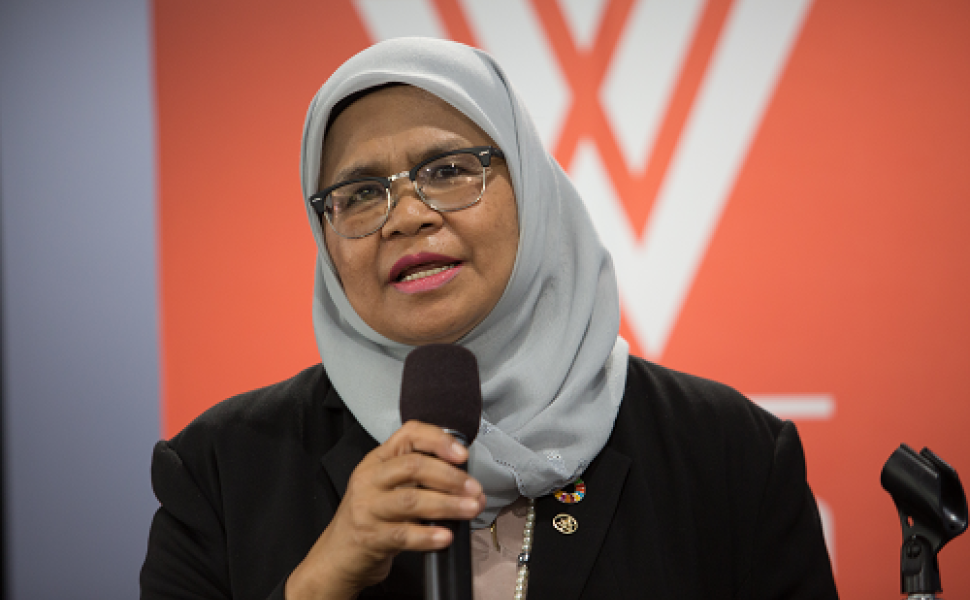She is One Episode 7: Planning for Parity


Behind every statistic, there is a story to tell.
An initiative of the Women in Public Service Project, She is One is sharing the stories of the women behind the numbers. Join the conversation using #SheIsOne.
Learn more about the numbers driving global gender parity with our Global Women's Leadership Initiative Index.
In this episode, Maimunah Mohd Sharif, Executive Director of UN-Habitat, shares strategies to promote education and gender equity in order to build inclusive cities. Confirmed unanimously in December 2017 by the UN General Assembly, Ms. Sharif is the first Asian, first Muslim, and second woman to lead the Nairobi-based agency with the mission of promoting socially and environmentally sustainable towns and cities, which will be home to two-thirds of the world’s population by 2050.
As a woman who has led at both the local and global level, Maimunah Mohd Sharif holds a unique perspective on leadership and gender equality. She believes a good education can empower people and ensure a good quality of life for every citizen. Ms. Sharif’s parents, who believed “education can change one’s life,” insisted on providing the best education for her from the beginning. Ms. Sharif says her vision about city planning sharpened in the U.K. where she finished her college study, and she got more opportunities and choices later because of her good education.
Ms. Sharif started as a town planner at the Municipal Council of Penang Island. She then worked in many development control and planning projects of Penang city before she was nominated as the Director of Planning and Development of the city. Ms. Sharif was the first woman to be appointed President of the Municipal Council of Seberang Perai before serving as the Mayor of the City Council of Penang Island.
Ms. Sharif argues that women still face many unique challenges in Malaysia, such as inequity in education. She also noticed that bias persists in the way women are viewed in the society because women, including female leaders, have to work harder than their male counterparts, and have to prove that they really can take the role. Ms. Sharif further notes that while the number of female students has risen above the number of male students in Malaysia’s universities, women do not receive the same opportunities in society. She believes “the problem is in the group of decision-makers”: everything people experience has been designed and shaped by men. And different policies, culture, social environments, and income levels in Malaysia have undermined the realization of gender equality. While she was Mayor, Ms. Sharif’s city was among the first to go through the Gender Responsive Participatory Budgeting, to integrate gender perspectives into budgetary and development and planning policy. “It was not easy, I only had two women counselors with me at that time.” Ms. Sharif says, “but this is for everybody around us. Therefore, the belief and struggles are going on together.”
As an Executive Director at UN-Habitat, Ms. Sharif looks forward to providing more resources for women, such as educational opportunities, job opportunities and facilities for mothers. She believes the agency is the best platform for supporting women, and that this support can be a good example for local and regional governments to build inclusive cities. She insists that “if the city design is fit for women, it would fit everyone.”
Ms. Sharif offers three pieces of advice to young women: belief in yourself, think positively and choose a good environment with good peers. She emphasizes that positive thinking is the most important thing to overcome challenges. Realizing gender equality, according to her, will be difficult, but it can happen if people work together to make cities more inclusive.

Global Women's Leadership Initiative
The Global Women’s Leadership Initiative has hosted the Women in Public Service Project at the Wilson Center since June, 2012. The Women in Public Service Project will accelerate global progress towards women’s equal participation in policy and political leadership to create more dynamic and inclusive institutions that leverage the full potential of the world’s population to change the way global solutions are forged. Read more


Urban Sustainability Laboratory
Since 1991, the Urban Sustainability Laboratory has advanced solutions to urban challenges—such as poverty, exclusion, insecurity, and environmental degradation—by promoting evidence-based research to support sustainable, equitable and peaceful cities. Read more
